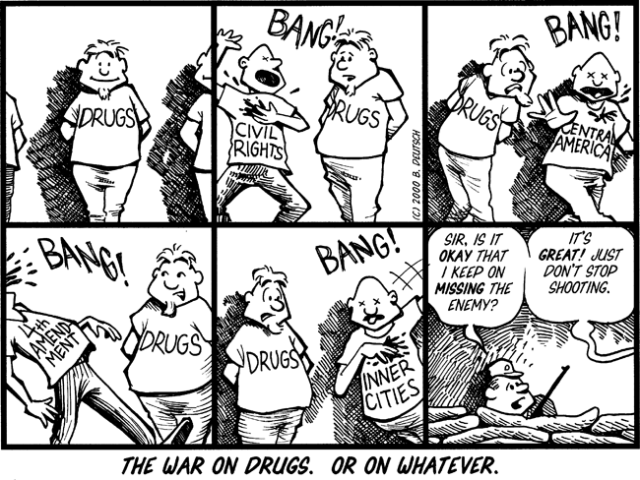
Over the past decades, civil libertarians have warned that right-wing politicians were moving towards an all-embracing police state, using the media-generated panics of the “War on Drugs” and the “War on Terror” as their stalking horses.
The Australian Crime Commission (ACC) is one of many police organisations set up after the September 11, 2001 terrorist attacks in the US. Supposedly established to fight organised crime, the ACC seems to find this task too difficult, and its operations instead target drug enthusiasts and smaller criminal networks.
Its powers are extraordinary: it can burgle your house, tap your phone, and tape your conversations. If you are summoned by the ACC, you commit a crime if you tell anyone. You have no right to silence, and if you refuse to answer their questions you will be jailed for contempt.
But the ACC believes it has insufficient funding and powers, and its CEO recently used an ABC TV Four Corners program to lobby for more resources.
The documentary, Crime Incorporated, aired on August 30. It claimed to expose organised crime in the Australian drug trade. It relied on privileged information given by the ACC and, in turn, the police gained publicity to boost their agencies and their careers.
Crime Incorporated told the story of Operation Hoffman. Four CornersJournalist Nick McKenzie said this secret ACC investigation extended “well beyond the bounds of most police operations to expose an entire criminal network, laying bare the threat posed by organised crime”.
According to John Lawler, the CEO of the Australian Crime Commission: “The general public need[s] to know the breadth and the scope of organised crime and the damage it's doing to them.”
However, no such picture emerged.
Instead of organised crime, we were shown a network more accurately described as disorganised crime: the Comanchero outlaw motorcycle gang and their less-than-clever associate, the so-called Facebook gangster, Hakan Ayik.
Ayik foolishly uploaded pictures of the members of his drug-smuggling network onto his Facebook page, saving the ACC considerable leg-work.
Was he Mr Big? Ayik flaunted his $300,000 supercar and his expensive watches on Facebook. The 35,000 ecstasy tablets the gang was caught with seems a lot, but this was only about 0.2% of the average amount of ecstasy seized in Australia.
Ayik and the Comancheros were Mr Big-Enoughs, not Mr Big. Their disappearance will create room for another syndicate, which will replace them, as McKenzie recognised.
He said: “The issuing of an arrest warrant for Hakan Ayik brings to end Operation Hoffman. It has run for more than two years, at great expense and with notable successes, including more than six major drug busts, a weapons haul, multi-million dollar cash seizures, and the crushing of a powerful crime cell.
“But there is little cause for celebration.”
At the top of the drug trade, the money, the seizures, and the power increase by a factor of 100 over the likes of Ayik and the Comancheros.
Rather than dealing with outlaw bikies, you deal with members of the ruling class.
That is what commissioner Frank Costigan QC concluded after his investigation into organised crime in Australia in 1984. The coded names in his report, “the Squirrel” (aka the Goanna) and “the White Knight”, covered the identities of some of the most powerful businessmen in Australia.
If men like this, not bikie gangs, run the drug trade, how can it be controlled?
Costigan argued that organised crime reached into all facets of Australian society, with hard-line criminals of the old underworld working hand in glove with politicians, lawyers, accountants, bankers and businessmen in the upper world of high society.
Because of the power of this network, Costigan called for a standing royal commission, the National Crime Authority, (the NCA) to deal with this “Ocker Nostra”.
The NCA was set up to be independent of government. In 2001, the NCA issued a commentary on organised crime and the drug trade, which stated that illicit drugs were “the most lucrative commodities for organised crime in Australia”.
When the NCA suggested controlling the illicit trade by treating addictive drugs as a medical problem, thus contradicting the then-Howard Coalition government’s “Tough on Drugs” policy, then-PM John Howard abolished it, setting up the Australian Crime Commission (under the control of the Australian Federal Police) to replace it.
Costigan, in his submission to parliament, said: “In the end we have a new body to be set up, dominated by police forces and possessed of powers which the Parliament has always refused to give to police forces. This has been done without any sensible justification for the abolition of the National Crime Authority.”
Crime Incorporated introduced itself as “a story of the untold battle that the good guys may not be winning”, but are the ACC really the good guys? Do they really need more money? (The ACC budget is about $100 million a year.)
Given their extraordinary Star Chamber powers, do the ACC need to be given greater powers?
There was another question that Four Corners was careful not to raise: could it be that the “War on Drugs” is misconceived and unwinnable, as the NCA claimed before it was abolished?
Retired ACC investigator Michael Purchas described the futility of the “War on Drugs” in the Four Corners program: “I mean you take a group away, there's plenty of room in the market space. It will reform very, very quickly. We've done nothing that will stop it reforming and there is very little that you can do.”
[Dr John Jiggens is the author of The Killer Cop and the Murder of Donald Mackay.]

Comments
Anonymous replied on Permalink